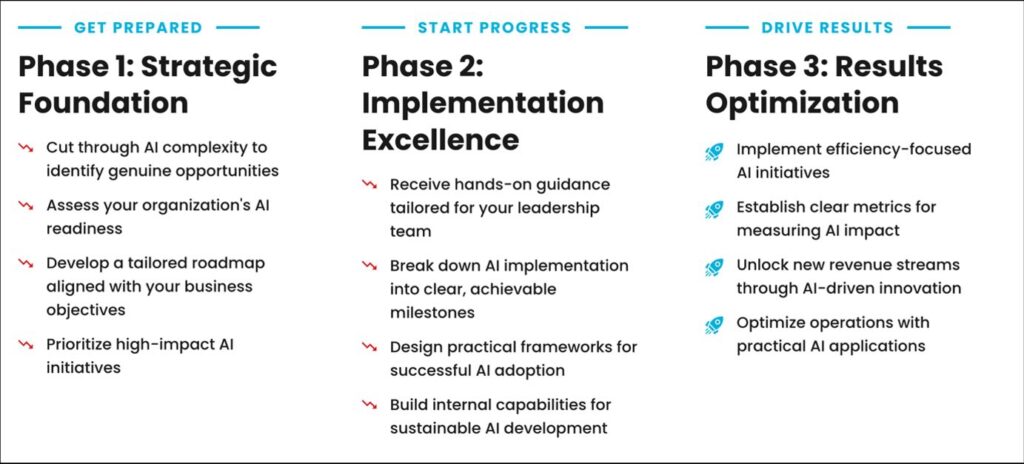Introduction to AI-Driven Transformation: AI in Sales
In an era of digital transformation, B2B sales teams are navigating a landscape marked by fierce competition and rapid technological advancements. Artificial intelligence (AI) has emerged as a pivotal tool, reshaping the way sales processes are optimized for efficiency, personalization, and growth. This article delves into the state of B2B sales, highlighting the key challenges and the transformative potential of AI in empowering sales teams to achieve measurable productivity gains.
Key Challenges in B2B Sales Today
Inefficient Lead Qualification
Sales teams often struggle with sifting through countless leads, only to find a significant portion unqualified or non-responsive. This process drains resources and slows down the sales funnel.
Data Overload
With an overwhelming volume of data, sales professionals face difficulties in extracting actionable insights. This “paralysis by analysis” hampers decision-making and slows progress.
Poor Forecasting Accuracy
Accurate sales forecasting remains elusive for many teams due to low-quality data inputs and underperforming algorithms, leading to missed targets and ineffective planning.
The Role of AI in Addressing Sales Challenges
Enhancing Lead Qualification
AI-powered tools can analyze vast datasets, identifying high-potential leads with precision. Predictive analytics help sales teams focus their efforts on prospects most likely to convert.
Streamlining Data Analysis
AI solutions automate data processing, transforming raw information into valuable insights. By using tools like CRM-integrated analytics platforms, sales teams can prioritize tasks that drive revenue.
Improving Forecasting Accuracy
Advanced AI algorithms leverage historical data and real-time inputs to enhance forecasting reliability. This enables teams to plan strategically and allocate resources effectively.
Applications of AI in Sales – B2B Strategies
AI-Driven Sales Enablement
Sales enablement platforms enhanced with AI provide personalized training modules, optimize sales collateral, and streamline content delivery to meet specific team needs.
Hyper-Personalization at Scale by Applying AI in Sales
AI enables “hyper-personalization,” crafting tailored communication strategies for individual prospects. This approach drives deeper engagement and builds stronger customer relationships.
Automating Repetitive Tasks
AI tools free up sales teams by automating administrative tasks such as email follow-ups, meeting scheduling, and data entry, allowing professionals to focus on strategic activities.
Value-Based Selling
AI-powered analytics identify customer pain points and tailor solutions that deliver measurable value. This approach fosters trust and positions the sales team as strategic partners.

Building a Framework for AI Adoption in Sales
Phase 1: Overcoming Individual Resistance
Educating leadership and team members about the benefits of AI is crucial. Hands-on exercises and personalized coaching sessions can help overcome skepticism and build confidence in AI tools.
Phase 2: Implementing Team-Level Excellence
Workshops focused on real-world applications of AI empower teams to leverage these tools effectively. Collaborative exercises enhance both individual productivity and team cohesion.
Phase 3: Scaling AI Across the Organization
Identifying and piloting the right use cases paves the way for scalable AI adoption. Strategic alignment ensures that AI initiatives are tailored to the organization’s unique goals and culture.
Generative AI: Unlocking New Possibilities in Sales
Personalizing Client Interactions
Generative AI, such as ChatGPT, enables teams to craft personalized proposals, follow-ups, and communication materials at scale, creating a more engaging customer experience.
Rapid Proposal Customization
By integrating CRM data with AI models, sales teams can generate tailored proposals that address specific client needs, shortening the sales cycle and boosting conversion rates.
Strategic Insights and Planning
Generative AI provides actionable recommendations by analyzing competitor strategies, market trends, and customer feedback, enabling sales leaders to make informed decisions.
Real-World Case Study: Driving Growth with AI in Sales
Challenge: A manufacturing client struggled with high operational costs and inefficiencies.
Solution: By applying AI in Sales, the sales team crafted a personalized pitch emphasizing operational cost savings and efficiency improvements. Automated workflows and predictive analytics highlighted the tangible ROI of the proposed solution.
Outcome: The client reduced costs by 20%, improved production efficiency, and strengthened trust in the sales team’s recommendations.
Best Practices for AI Integration in Sales Strategy
- Start Small: Identify low-risk, high-impact use cases to demonstrate quick wins.
- Focus on Training: Equip teams with the knowledge and skills needed to maximize AI tools.
- Align with Goals: Ensure AI strategies are directly tied to organizational objectives.
- Leverage Analytics: Use AI-driven insights to continuously refine sales strategies.
Monitor and Iterate: Regularly review AI implementations and make adjustments based on performance metrics.
Conclusion: Embracing the Future of AI in Sales
AI is more than a tool; it’s a transformative force that enables B2B sales teams to achieve unparalleled productivity and success. By addressing inefficiencies, automating repetitive tasks, and fostering hyper-personalization, AI empowers organizations to navigate challenges and capture growth opportunities. For companies ready to embark on their AI journey, the time to act is now.

